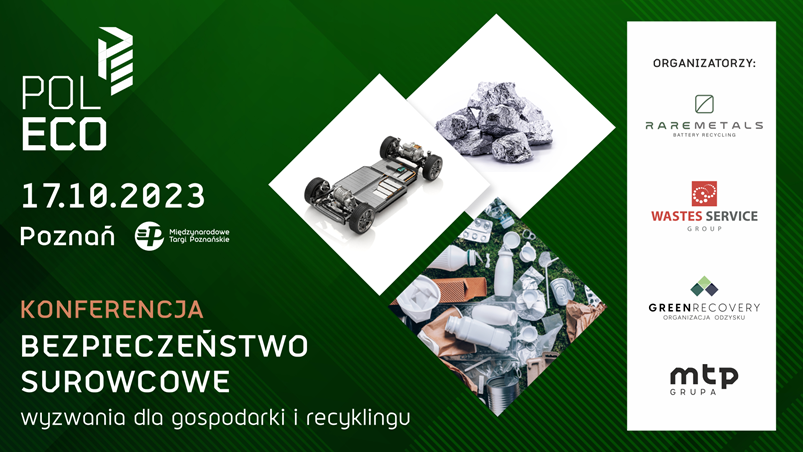We invite you to the conference "Raw material security - challenges for the economy and recycling"

Conference
"Raw material security - challenges for the economy and recycling"
Poznań, MTP, hall 5, stage, October 17, 2023
A thriving economy is based on access to a variety of raw materials that are the basis for the production and creation of goods. In the face of growing global competition and environmental changes, the issue of raw material security becomes of key importance. In addition, key and strategic raw materials play a special role in the functioning of the economy, as they are irreplaceable for many industrial sectors and are of great importance for national security and economic stability. Ensuring access to these raw materials becomes a challenge, especially in the context of changing international relations and global competition. In order to maintain sustainable development and minimize environmental impact, it is necessary to manage raw material resources and promote recycling efficiency.
Raw materials from waste equipment, batteries and packaging, often referred to as secondary raw materials, are an important element of the global raw material supply chain and are crucial to achieving sustainable development and minimizing environmental impact. In today's world, where consumption is growing exponentially, the management of these raw materials becomes not only an economic necessity, but also a social and ecological issue.
Arguments for:
- Metals from electronics and electrical equipment: Electronics and electrical equipment contain valuable metals such as gold, silver, copper and palladium. Recycling these devices recovers these raw materials, which not only reduces the extraction of these metals, but also reduces the amount of electronic waste in landfills.
- Batteries: Batteries are an essential part of our daily lives, but also a source of valuable raw materials such as lithium, cobalt and nickel. Efficient recycling of used batteries is essential to recover these raw materials.
- Packaging: Packaging, whether plastic, glass or paper, is a widely used product whose consumption is increasing with the development of consumerism. Recycling of packaging allows you to reduce tree felling, energy consumption and CO2 emissions associated with the production of new packaging. In addition, recycling plastic packaging reduces the problem of plastic pollution in the oceans and ecosystems.
- Supply diversification: Too much dependence on a single source of raw materials can lead to the risk of shortages due to conflicts, natural disasters or political changes. By developing diverse sources of raw materials and promoting recycling, the economy can be made more resilient to unexpected disruptions.
- Economic efficiency: Recycling and recovery of raw materials are often more economically efficient than traditional sourcing methods. They also create new jobs in the recycling and secondary raw material processing sector.
- Technological innovation: Faced with limited natural resources, economies are forced to look for innovative ways to extract, process and recycle raw materials. This, in turn, accelerates the development of new technologies and scientific progress.
- Sustainability: The need to conserve raw materials and reduce their consumption drives the economy towards a more sustainable development, which is crucial for future generations.
Arguments against:
- Initial costs: The introduction of more complex recycling and recovery systems may require significant initial investments, which may be difficult to implement in some sectors of the economy.
- Technological barriers: Some types of raw materials are difficult to recycle due to complex technological processes or the presence of impurities, which poses a challenge to the efficiency of this process.
- International cooperation: Introducing changes in the area of raw material security requires the cooperation of many countries and organizations, which may be difficult to achieve due to political and economic differences.
- Consumerism: A culture of consumerism and a rapidly growing population can lead to an increase in demand for raw materials, making it harder to meet resource security goals.
Raw material security is becoming an increasingly important topic in the context of the global economy
and the environment. The introduction of effective raw material management strategies, including key and strategic raw materials, and the promotion of recycling are necessary to achieve sustainable development. However, achieving these goals requires a balanced approach, taking into account both ecological and economic aspects, and coordinated cooperation at the international level.
Promoting the efficiency of recycling and the circular economy is essential in the context of raw material security. Businesses and consumers should be encouraged to segregate
and recycling, as well as developing technologies enabling a more effective process of recovering raw materials from waste. In addition, there is a need for regulation that will promote response

*The organizers reserve the right to change the program.



